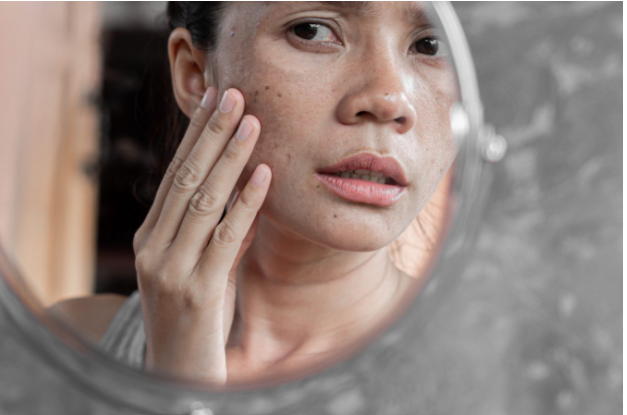
Melasma is a common skin condition that affects many individuals, causing dark patches and discoloration on the face. Understanding its causes, treatments, and prevention methods is essential for maintaining clear, healthy skin.
Dive into our comprehensive guide to learn more about melasma and how to tackle it effectively.
Understanding Melasma: Causes, Treatments, and Prevention
Melasma is a skin condition that can significantly impact your confidence and quality of life. This article delves into the causes of melasma, the most effective treatments available, and preventive measures you can take to keep your skin clear and healthy. Let’s explore this common skin issue in detail.
What Is Melasma and Who Gets It?
Melasma is a common skin condition that manifests as dark, discolored patches on the skin, primarily affecting the face. This condition is often referred to as the “mask of pregnancy” because it frequently occurs in pregnant women.
However, melasma can affect anyone, regardless of gender or age. Understanding melasma’s characteristics and identifying who is most susceptible to it can help manage and treat this condition effectively.
What Is Melasma?
Melasma is characterized by the appearance of symmetrical patches of hyperpigmentation, usually on sun-exposed areas of the face. These patches are typically brown or gray-brown and commonly appear on the cheeks, forehead, bridge of the nose, and upper lip.
Occasionally, melasma can also affect other areas of the body that are frequently exposed to the sun, such as the forearms and neck.
The discolored patches result from an overproduction of melanin, the pigment responsible for skin color. When melanocytes (the cells that produce melanin) become overactive, they produce excess pigment, leading to the formation of these dark patches.
The exact mechanism that triggers this overactivity is not fully understood, but several factors are known to contribute to its development.
Who Gets Melasma?
Melasma is a multifactorial condition, meaning it can be influenced by various factors, including genetics, hormonal changes, and environmental factors. Let’s delve into who is most likely to develop melasma and why.
Women
Women are significantly more likely to develop melasma than men. In fact, about 90% of melasma cases occur in women. This higher prevalence is largely attributed to hormonal changes.
Estrogen and progesterone, the primary female sex hormones, can increase melanocyte activity. As a result, conditions or life stages that involve hormonal fluctuations, such as pregnancy, oral contraceptive use, and hormone replacement therapy, can trigger or exacerbate melasma.
During pregnancy, for example, the increased levels of estrogen and progesterone stimulate melanocytes, which leads to the dark patches characteristic of melasma.
This is why melasma is often called the “mask of pregnancy.” Similarly, women taking birth control pills or undergoing hormone replacement therapy may notice the onset or worsening of melasma due to hormonal influences.
Men
While melasma is more common in women, men can also develop this condition. The prevalence is lower, but the underlying causes are similar. Men who develop melasma often have a genetic predisposition or experience significant sun exposure.
Unlike in women, hormonal factors are less likely to be a primary trigger in men.
Individuals with Darker Skin Tones
People with darker skin tones, such as those of Hispanic, African, Asian, and Middle Eastern descent, are more prone to melasma. This increased susceptibility is due to the higher baseline activity of melanocytes in darker skin. As a result, these individuals are more likely to experience hyperpigmentation in response to triggers such as sun exposure or hormonal changes.
Family History
Genetics play a crucial role in the development of melasma. If you have a family history of melasma, your risk of developing the condition is higher. Genetic predisposition means that your melanocytes may be more reactive to hormonal changes, sun exposure, and other contributing factors.
Sun Exposure
Regardless of gender or skin tone, sun exposure is a significant trigger for melasma. Ultraviolet (UV) radiation from the sun stimulates melanocytes, leading to increased melanin production.
People who spend a lot of time outdoors without adequate sun protection are at a higher risk of developing melasma or experiencing worsening of existing melasma.
Medications and Skincare Products
Certain medications and skincare products can increase the skin’s sensitivity to sunlight or directly irritate the skin, potentially leading to melasma. Examples include some antibiotics, anti-seizure medications, and phototoxic drugs.
Additionally, using skincare products that cause irritation or allergic reactions can trigger melanin production as part of the skin’s inflammatory response.
Is Melasma a Permanent Condition?
Melasma can be a chronic condition, meaning it may persist for a long time or recur. While it isn’t harmful, its appearance can cause emotional distress. Understanding the nature of melasma can help manage expectations and treatment outcomes.
What Causes Melasma?
Several factors contribute to the development of melasma. Key causes include:
- Hormonal Changes: Pregnancy, birth control pills, and hormone replacement therapy can trigger melasma.
- Sun Exposure: UV radiation stimulates melanocytes, the cells responsible for pigmentation, leading to melasma.
- Genetics: A family history of melasma increases your risk.
- Medications and Skincare Products: Certain drugs and cosmetic products can make your skin more susceptible to melasma.
Can Stress Cause Melasma?
Stress itself doesn’t directly cause melasma, but it can exacerbate the condition. Stress affects hormone levels, which can, in turn, influence melasma.
How Can You Treat Melasma?

Treating melasma involves various approaches, and it’s often necessary to combine treatments for the best results. Here are some effective treatments:
- Topical Treatments: Hydroquinone, tretinoin, and corticosteroids are common topical treatments that help lighten the skin.
- Chemical Peels: These treatments use acids to remove the top layers of skin, promoting the growth of new, healthy skin.
- Laser Therapy: Lasers target and break down melanin, the pigment causing dark patches.
- Microdermabrasion: This minimally invasive procedure exfoliates the skin, helping to improve its texture and tone.
Are Over-the-Counter Treatments Effective?
Over-the-counter treatments can be helpful, especially for mild cases of melasma. Products containing ingredients like niacinamide, vitamin C, and licorice extract may improve skin appearance.
How Can You Prevent Melasma?
Preventing melasma involves protecting your skin from known triggers. Here are some tips:
- Use Sunscreen Daily: Apply a broad-spectrum sunscreen with SPF 30 or higher every day, even on cloudy days.
- Wear Protective Clothing: Hats and sunglasses can shield your face from UV radiation.
- Avoid Peak Sun Hours: Stay out of the sun between 10 AM and 4 PM when UV rays are strongest.
- Be Mindful of Skincare Products: Use non-irritating skincare products suitable for sensitive skin.
Can Diet Influence Melasma?
While there’s no direct link between diet and melasma, a healthy diet can support overall skin health. Foods rich in antioxidants, such as fruits and vegetables, may help protect your skin from damage.
How Revival Clinic Can Help
At Revival Clinic, we specialize in personalized skin care treatments for melasma.
Our expert team will assess your skin quality, melasma severity, and hormonal factors to recommend the best course of action tailored to your needs. We offer a range of treatments, including:
- Customized Topical Treatments: Prescription creams formulated specifically for your skin type.
- Advanced Laser Therapy: Cutting-edge laser treatments to target and reduce melasma effectively.
- Professional Chemical Peels: Safe and effective chemical peels performed by our experienced professionals.
Additionally, we provide comprehensive care that includes:
- Finding the Root Causes: Assessing skin quality, melasma severity, and hormonal factors.
- Hormonal Evaluation: Advising a blood test if the melasma is related to hormonal imbalances.
- Diverse Treatment Options: Offering treatments such as topical creams, oral supplements, advanced laser therapy, micro-needling, Potenza radiofrequency, and more.
- Timely Treatments: Ensuring treatments are performed at the optimal time for maximum effectiveness.
By addressing the underlying causes and providing a tailored treatment plan, Revival Clinic ensures effective and lasting results for melasma management.
Why Choose Revival Clinic?
- Experienced Staff: Our team comprises highly skilled doctor and skin care experts.
- Personalized Care: We tailor treatments to suit your unique skin needs.
- State-of-the-Art Technology: We use the latest technology to ensure the best results for our patients.
Frequently Asked Questions About Melasma
Is Melasma More Common in Women?
Yes, melasma is more prevalent in women, particularly those with darker skin tones and those experiencing hormonal changes.
Can Men Get Melasma?
Men can develop melasma, but it's less common compared to women. The underlying causes are similar, including sun exposure and genetic predisposition.
Are There Any Natural Remedies for Melasma?
Some natural remedies, like aloe vera, turmeric, and apple cider vinegar, are believed to help lighten melasma. However, their effectiveness varies,
and they should be used with caution.
How Long Does It Take to See Results from Treatment?
Results from melasma treatment can take several weeks to months, depending on the severity of the condition and the treatment used. Consistency is key.
Contact Us
Ready to tackle melasma and achieve clearer, healthier skin? Contact us today to schedule a consultation
📞 Phone: +6017-7815237
✉️ Email: askrevivalclinic@gmail.com
📍 Address: 52A-G, Jalan Eco Santuari 8/2A, Eco Santuari 42500, Selangor
🌐 Website: www.revivalclinic.com.my
Don’t let melasma hold you back. At Revival Clinic, we’re committed to helping you feel confident in your skin. Reach out to us and start your journey to better skin today!

